Activities and outputs
Here you can find highlights from our public engagements and publications resulting from this project
Project Report - Security and everyday life in Macclesfield
29 May 2024
Project Report Available - Security and everyday Life in Macclesfield: Changing faces of safety and (dis)order in the 21st century.
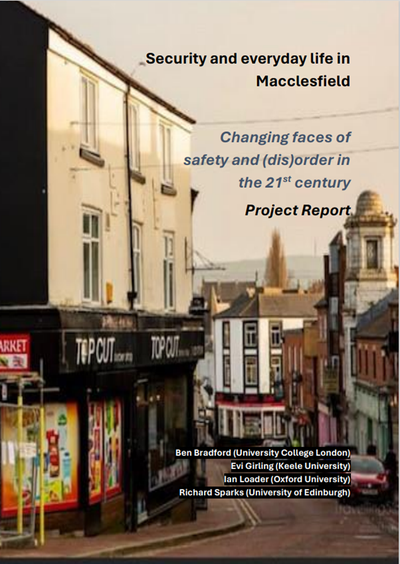
You can download our full report here: Security and everyday life in Macclesfield - PROJECT REPORT pdf
Executive Summary
In this report, we offer an account of the main findings of a study we conducted of everyday security concerns in Macclesfield. Between November 2019 and July 2023, we used a range of methods to investigate the experience and perceptions of safety and security among differently-situated people living and working in the town today. We interviewed people individually and in small groups, conducted two community surveys, spoke with the local authorities, police and other security providers, analysed local social media, observed public spaces, and spent time with a wide range of local groups.
Back in the mid-1990s, three members of the present research team conducted a similar study of ‘crime-talk’ in the town. In the 1990s, people in Macclesfield expressed a wide range of concerns, some of which reflected problems that were high on the public agenda nationally at that time. These included worries about burglary, car theft, and drugs and anti-social behaviour, especially around licensed premises and about groups of young people in public spaces. They also worried about the absence of visible policing in the town.
Our new study shows that those worries have not gone away. But they are today less prominent in what people tell us about what it is like to live in and feel safe in this town. For most of our participants, crime was not at the forefront of their accounts of concerns about the town and their ability to imagine a secure future there. Local place-talk in the 2020s is not first and foremost talk about crime – a striking change from what we found in the 1990s. The main findings of the present study are as follows:
- Drugs and drug-related disorders remain a major concern. But residents typically associate it with concerns about exploitation and vulnerability, and with its impact on the quality of their environment.
- People notice and often spoke to us about various forms of – sometimes hidden – social suffering in the town, and much of the work of local agencies, including the police, is today focused on these problems, domestic abuse and vulnerability related risks being prominent along them. This is also reflected in the work of the vibrant voluntary sector in the town.
- People’s attention nowadays seems more focused on a range of harms that we might broadly term ‘environmental’. Acts of care and repair of the physical and natural environment are a prominent feature of civic and everyday life in the town.
- There is a high level of concern about cars and traffic (including with speeding, poor parking, and driver behaviour near school gates).
- People spoke to us extensively about littering, graffiti, potholes and the future of the town centre that raise concerns about a deteriorating built and social environment.
- Residents seem less focused on – and for the most part less angry about – the service they receive from the police, and more concerned with what they see as the inability of local government to care for the infrastructure of the place in which they live.
In voicing such concerns, people also raise questions about who is or should be responsible for acting to solve or improve these problems, and sometimes about what actions they can take, individually and collectively, to express care for their locality and its future. Security and everyday life in Macclesfield - PROJECT REPORT pdf
Contribution to the 2023 Cumberland Lodge Policing Conference
23 Dec 2023
Cumberland Lodge Policing Conference contribution, December 2023
A member of the team (Professor Ian Loader) participated in conversations with senior police officers, practitioners, non-profit organisations and the private sector. The topic for the conference was Getting the right things done: delivering good policing in the 2020s. Professor Loader presented findings from the project and his contribution and the Macclesfield research sparked questions and discussions during the weekend.
Macclesfield Civic Society Presentation
25 Jan 2024
Presentation of project findings at Macclesfield Civic Society Talk evening on the 17th of January 2024 at Macclesfield Library
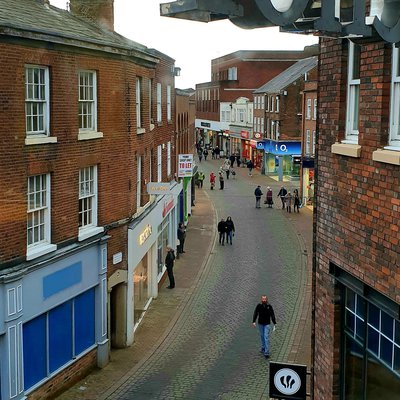
Dr Evi Girling presented project findings to the Macclesfield Civic Society. The talk was titled What makes us feel safe and secure in Macclesfield? Changing faces of safety and (dis)order The project has a long standing connection with the Macclesfield Civic Society going back to our earlier research in the mid 1990s. Our shared interest in the town, its pasts and futures made for an engaging and informative evening and discussion.
Presentation of findings to 2023 European Criminology Conference
23 Sep 2023
Presentation of project findings at International Conference (European Criminology Conference, Florence, 2023)
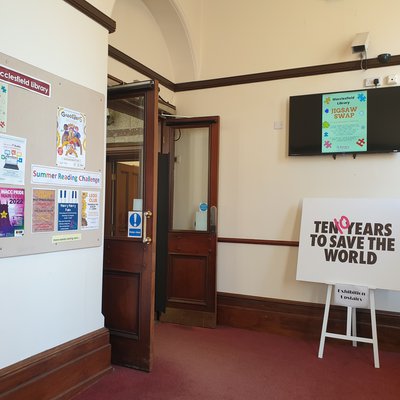
The team organised two panels at the conference to present findings and to engage in conversation with other related work happening elsewhere with a view to opening up new ways thinking about the relation of in/security to the ‘environment’.
Professor Ian Loader chaired the discussion in the first conference panel which included contribution from ourselves on The (new) ecology of security: Tribulations of sustainable security in an English town.
Other contributors were:
Julie Berg, University of Glasgow; Clifford Shearing, University of Cape Town on Normalised crises, sense-making and everyday security governance
Kajsa Lundberg, University of Melbourne on Climate security and urban everyday solutions:
Nina Peršak, Institute for Criminal-Law Ethics and Criminology, Ljubljana; Anna Di Ronco, University of Essex on Reimagining security through redefining incivility, liveability and legitimate urban governance
Professor Richard Sparks chaired the second conference panel which included a contribution from ourselves on ‘Seeing disorder’ in an English Town
Other contributors were:
Anna Souhami, University of Edinburgh on Environments of vulnerability: landscape, weather, light and darkness in remote island policing
Leo Kritikos, University of Edinburgh on Community led planning for safety: A poisoned chalice?
Alison Young, University of Melbourne; Hristijan Popovski, University of Melbourne; Kajsa Lundberg, University of Melbourne on Social Exclusion and Spatial Justice in the Volumetric City
Both Panels were very well attended and there was a lively discussion and interest in our two presentations.
Presentation of findings to Hope Supporters Evening, 15th November 2023, HTC Community Hub
18 Nov 2023
Members of the team presented findings from the project to a Hope Supporters Evening Hope Supporters Evening, 15th November 2023 at HTC Community Hub.

Members of the team presented findings from the project to a Hope Supporters Evening, the meeting was an opportunity to present findings to the vibrant faith based community sector in Macclesfield.
Team presents paper at the annual British Society of Criminology in June 2022
30 Jul 2022
Inescapable Objects? Reflections on the place of cars and automobility in our findings
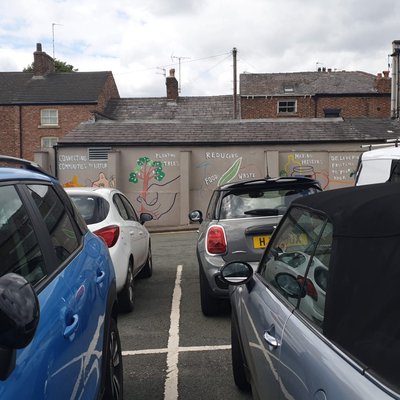
Professor Ian Loader and Dr Evi Girling presented a paper drawing from our emerging project findings. The paper was titled: Inescapable objects?: Everyday security in a car-centric town
Abstract/Summary
In our present study of security and everyday life in an English town (Macclesfield in Cheshire), numerous sources of data suggest that concerns about cars – their volume, speed, (bad) parking, presence at school ‘drop-off’, and overall effect on the ecology of the town – loom large in the preoccupations of local people. It has been common in work on public insecurities – including, we should add, our own previous study of the same town – to skip over these stated concerns in favour of more ‘serious’ (or obviously criminological) threats to people’s feelings of safety. But what happens if we don’t do that and, instead, treat automobility as a ubiquitous and consequential impediment to people’s sense of their town as a liveable place? In this paper, we document and make sense of the range of concerns, and forms of regulatory contestation, that arise with respect to the car’s prominent place in the local harmscape. We then reflect, more widely, on what might follow from folding systems of automobility into how we investigate and theorize the sources and meanings of everyday security.
Policing and Sense of Place - Publication in The British Journal of Criminology
30 Nov 2023
Findings from the project's survey work have been published in the British Journal of Criminology
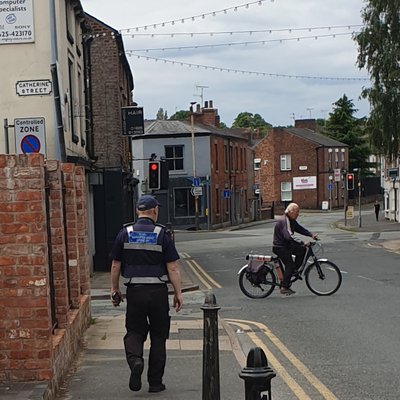
The paper is titled Policing and Sense of Place: ‘Shallow’ and ‘Deep’ Security in an English Town, The British Journal of Criminology, 2023 https://doi.org/10.1093/bjc/azad062
Abstract/summary
Much policy discourse concentrates on the contribution police make to keeping people safe. Often, this means minimizing fear of crime. Yet, more expansive accounts stress the extent to which deeper-rooted forms of security and belonging might also be important ‘outcomes’ of police activity. Using data collected from a survey of residents of a mid-sized English town, Macclesfield in Cheshire, we consider the extent to which evaluations of policing are associated with (1) a ‘shallow’ sense of security—roughly speaking, feeling safe—and (2) a ‘deeper’ sense of security—being comfortable in, and with, one’s environment. Focussing more accurately on the forms of safety and security police can hope to ‘produce’ opens up space for consideration of the ends they seek as well as the means they use.
Team present two papers at the 2023 Howard League International Conference
24 Sep 2022
The team presented findings from the project in two panels to the Howard League Conference which took place 13–14 September 2022 at Keble College, University of Oxford
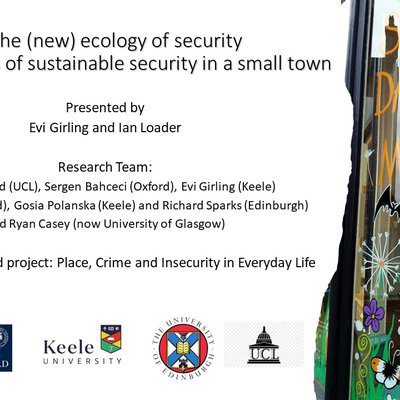
Dr Evi Girling discussed everyday environmental troubles and the 'greening' of everyday security concerns and acts of care in a paper called The (new) ecology of security: Tribulations of sustainable security in a small town
Abstract/Summary
Drawing on our current revisiting of an old research site, Macclesfield in Cheshire, this paper reflects on shifts in the local meanings of in/security since the mid-1990s. In revisiting the town, we discover a set of everyday troubles (littering, dog poo, the tribulations of parks and other valued public spaces) that appear to call forth established forms of environmental criminology (the ‘broken windows’ thesis; theories of ‘defensible space’ in urban design). But we have also encountered security concerns that attach themselves to new objects that are often described as environmental (pollution, flooding, and other local indicators of climate crisis). In this paper, we argue that both these ‘new’ and ‘old’ forms of environmental trouble are signs of a greening of security wherein problems such as street-drinking, litter, badly parked cars, flooding etc. matter because they are entangled with people’s sense of the liveability and sustainability of the places in which they strive to make meaningful lives. Discourse about ‘fear’ and ‘crime’ tends to be about moral boundary-drawing, defining place with reference to hostile ‘outsiders’, and defending these places from incursion. The new ecology of security shifts this orientation to protecting place in important respects. One is that concern for place is translated into practices of active caring, wherein questions of vulnerability, precarity, solidarity, resilience, and sustainability come to the fore. The second is greater consciousness of how ‘we’ (the insiders) have come become agents of our own peril - implicated in producing the security problems with which we are concerned.
Professor Ben Bradford presented a paper drawing from data from our survey on sense of place and trust in the police. It was titled Policing and place: Trust in the police, ‘narrow’ and ‘deep’ security in an English town
Abstract/Summary
In this paper we consider the contribution of policing to people’s sense of safety and security. Using data collected from a survey of residents of a mid-sized English town, we consider the extent to which evaluations of police activity and behaviour are associated with (a) a ‘shallow’ sense of security – roughly speaking, feeling ‘safe’ – and (b) a ‘deeper’ sense of security – being comfortable in, and with, one’s environment. Much policy discourse tends to concentrate on the contribution police can make to feelings of safety, narrowly defined. Yet, more expansive accounts stress the extent to which deeper rooted forms of security and belonging might be more important ‘outcomes’ of police activity; outcomes which, moreover, may be occluded or even inhibited by an excessive focus on demonstration of or at least claims to instrumental effectiveness. Our results resonate with these latter accounts. We find no link between perceptions of police effectiveness and subjective (un)safety, although there is an inconsistent association between police effectiveness and worry about crime. Yet, we find a strong association between perceptions of police fairness and people’s sense of attachment to and belonging within their community. By focussing more accurately on the forms of safety and security police can hope to ‘produce’, we open up space for consideration of the ends they seek to achieve as well as the means they seek to use. Yet, translating these ideas to more fraught social and political contexts – and those with higher crime rates – may be a significant challenge
Team present preliminary findings at the 2022 Macclesfield Eco Summit
9 Oct 2022
Presentation of emergent findings to Macclesfield 2022 Eco Summit October 8th 2022
Professor Loader presented preliminary project findings to Macclesfield 2022 Eco Summit focussing on how cars have emerged as a focal point of local concerns about everyday disorder since our earlier 1990s research. The event was organised by Macclesfield Town Council and Macctastic
You can find a recording of Professor Loader's talk here: A video recording of Professor Loader's presentation
Unsettled crossings
15 Dec 2023
Unsettled crossings: Underpass journeys in an English town (Paper published in Criminological Enounters)
Bachceci, S., Bradford, B., Girling, E., Loader, I., & Sparks, R. (2023). Unsettled crossings: Underpass journeys in an English town. Criminological Encounters, 6(1), 81-94.
Abstract
What kinds of ‘sensory configurations’ (Thomas, 2010), and moral orders, are created in places that are simultaneously formed and rendered marginal by infrastructures of hegemonic automobility? In this paper, we explore this question with reference to one micro-site we have encountered in our current study of security and everyday life in an English town – Macclesfield in Cheshire. That site is the Gas Road underpass, a key pedestrian route between the town centre and the east of the town on the other side of its busiest road. Underpasses are generic urban artefacts, mundane features of necessity, of light and darkness, of entry and exit, of solitude and transient encounter. This residual place is for many users one to be passed through, often quite quickly, without particular engagement. It is, on the other hand, also a regular gathering point for the homeless and young people, and a focus for intervention by local authorities, responding to concerns about public drinking and other undesired activities. The underpass provokes concerned talk among residents about the safety of those who (have to) use it, and unsettled debate among local decision-makers over how to beautify, illuminate, regulate, or otherwise improve it. In the paper, we use film, photographs, interviews and in situ observation, to explore the contested ways in which this place is sensed. We argue for a situated understanding of how this residual space unsettles the town’s sense of place, and for acknowledgment of how history and landscape shape the local meanings of such places and journeys.